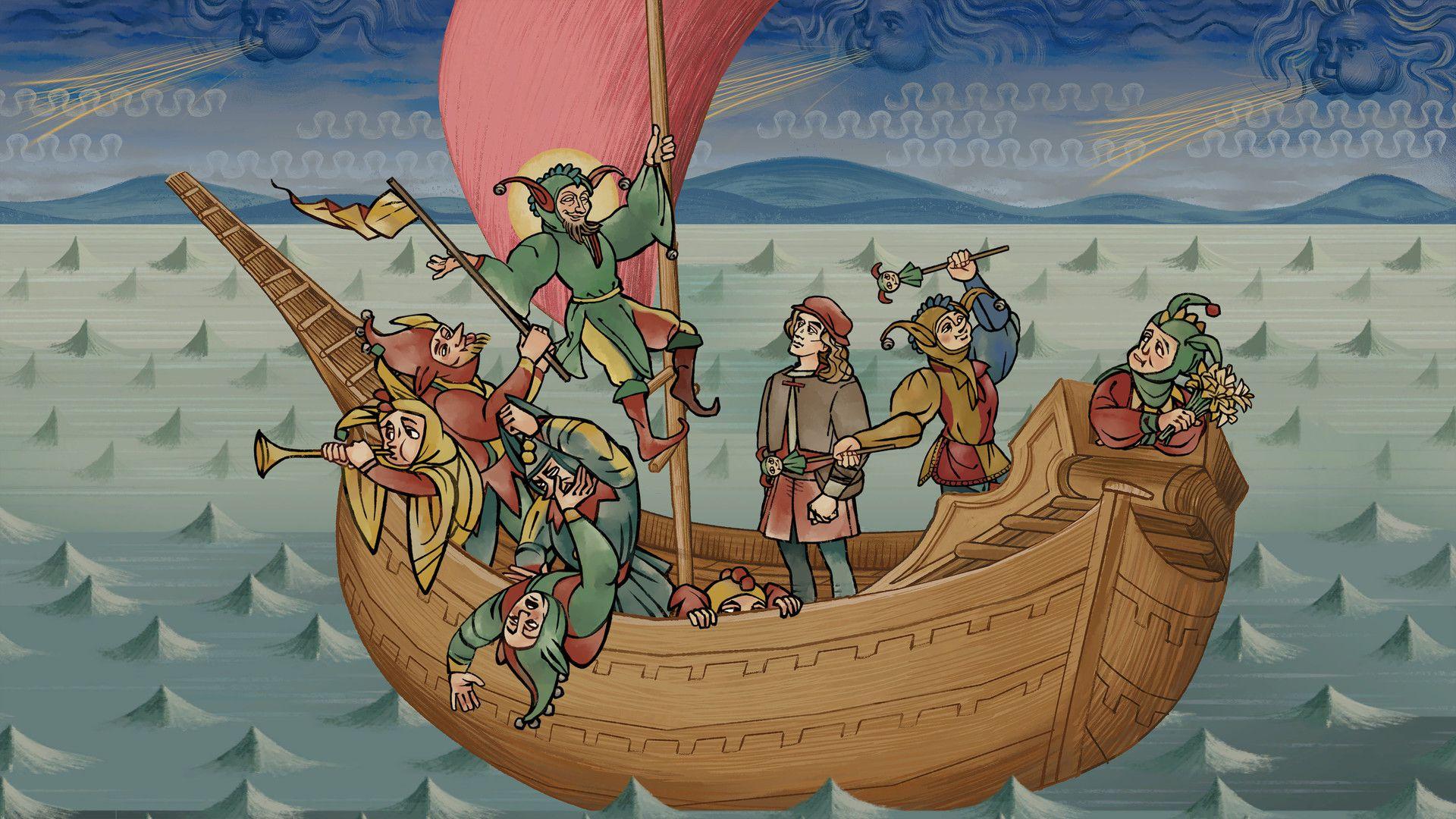Crafting Pentiment's Medieval Narrative
We sit down with narrative designer Zoe Fraznick for an in-depth interview

Pentiment, the latest game from Obsidian, is easily one of the most unexpected games of 2022. It’s a historical fiction narrative-driven mystery game set in a small Bavarian town in the sixteenth century in which the main character works as an illustrator for the large abbey run by Benedictine monks. The premise is undeniably esoteric. But the game itself draws you in from the get-go. The intriguing mystery and the empathy the game has for each of its characters worked together to create a sense of time and place so authentic and compelling that I spent about 14 hours straight playing it, and a lot more time afterwards thinking about it.
Zoe Franznick is a narrative designer at Obsidian, and worked extensively with Josh Sawyer, the game’s director, to construct the richly detailed and intricate world of Pentiment. She kindly agreed to sit down with me for a chat about the game, and shared some valuable insights about the making of Pentiment and what it took to bring the game to life.
SUPERJUMP: ‘Narrative designer’ as a role can entail different responsibilities depending on the studio. What was it like working on Pentiment? How did the idea for the design of the game come about?
Zoe Franznick: For Pentiment itself, I only came onto the project halfway through its development. I had just finished my Master’s degree in Medieval Studies at Trinity College, Dublin, and wanted to jump into game design. I expected to jump into something very fantasy-involved. When I applied to Obsidian, I didn’t know that Pentiment was in development in the background. Then, Josh [Sawyer, Pentiment’s director] essentially came to me saying something like, “Hey, how would you like to jump into this historical fiction game?” and I said “This is my bread and butter, I would absolutely love to do this!”
So, I can’t speak to its original development, but I do know that Josh has wanted to do a historical fiction game set in this time period for a very long time. And the period itself lends itself very well to Obsidian’s narrative style, especially the idea that choices matter.
When it comes to the narrative style, we aimed to have a more conversational style, because we did want to jump into that historical aspect and explore a lot of the themes in terms of what’s going on with the class tensions, the religious tensions – and a lot of times those are very bound up together, almost the same thing. That’s why we played with the idea of exploring one setting – Tassing – over a very long period of time.
"We wanted to explore what it means for players to see their choices matter over the course of twenty-five years."
SUPERJUMP: The long period of time is something that stood out to me. Twenty-five years! You don’t see very many games with stories taking place over that span of time. How and when did that decision come about?
Zoe Franznick: That was a pretty early decision in the narrative process. We very much wanted to explore this single location, whereas a lot of games traditionally focus on what you can do over a very wide area. Instead, we sort of flipped that on its head. In historical fiction, and especially this time period, there was so much change going on in the world, with the advent of the printing press, the peasant wars, the Reformation, there’s a lot of things occurring over decades.
You can’t really get as strong of a narrative from a singular “snapshot”, if you will. So, we leaned into that historical narrative, and the fact that it is a narrative adventure game. We wanted to explore what it means for players to see their choices matter over the course of twenty-five years. And when you start playing with that narrative standpoint, suddenly, instead of the player making a big impact and then walking away, you get to see a young girl grow up into a woman – does she marry, does she have kids, what does that look like, and how does that impact you, the player as you’re experiencing the game. And so, for us, a lot of that was leaning into Obsidian’s core value of choices mattering for the player.
SUPERJUMP: That definitely comes through. The setting itself feels like it's at a crossroads. We, the audience, have the benefit of hindsight and largely know how things will progress, but the characters in the game don’t. This ‘crossroads’ aspect also seems to be reflected in the mysteries in each of the acts. How were the mysteries in each act constructed?
Zoe Franznick: The mystery is core to the narrative of the game. We took a lot of inspiration from mysteries that occur in historical fiction, such as Umberto Eco’s The Name of the Rose and The Return of Martin Guerre. Both of these were major influences on Pentiment and are, if not murder mysteries, then mysteries themselves, and so that was always a core motif of the game.
But even then, there was a lot more we wanted to explore in Tassing, and so even as you have different mysteries going on, everybody else in Tassing is also living their own independent and rich lives. So even while you, as Andreas Maler are focused on solving this murder mystery, you also interact with people who are just trying to live their day-to-day lives and get through this weird space in time.
But, to come back to the question, the mystery was always a core tenet of what Pentiment was going to be, and then we expanded it as we developed it and got into “What would this look like, if we played into that character’s perspective?” or “What about the greater implications of having printers versus illuminators at the monastery?”, and other facets of the time like that.
"We wanted to lean into the unclear morality."
SUPERJUMP: Would you say that each suspect represents an aspect of the ongoing tensions in the setting?
Zoe Franznick: It wasn’t a deliberate choice. We didn’t create the different suspects as paragons of a class or gender or anything like that. It was never deliberate because people of that day and age were very multifaceted, just like we are today. We wanted to reflect that, so they’re not archetypes that you can point at and say “Ah yes, this character represents the tensions around the Reformation regarding Transubstantiation!”
Instead, each individual has their own reasons for potentially having committed this murder and it is up to you, the player, to explore that, or choose not to explore that at all, and figure out if this person could have done it , and if you want to accuse them. You don’t even have to have a good reason to accuse somebody. You could simply not like one of them, and point at them and say “Alright, you, I want you out of here!”
We wanted to lean into the unclear morality. We say “Hindsight is 20/20” but in creating Pentiment, we wanted to immerse you in the game and give you the sense of “Yeah, you don’t have hindsight”. The player may understand what happened in terms of the historical events of the time but Andreas doesn’t know any of that, and you as the player don’t understand the lives of the individuals who live in Tassing. It’s up to you explore that and to understand their reasons for making their choices, whether or not they’re connected to the murder. There are plenty of individual choices, like talking with the miller (Lenhardt) – why doesn’t he like the peasants? We wanted to explore and present all of that in a way that doesn’t present history as good or bad, or in terms of characters being archetypes.
SUPERJUMP: On my first playthrough, because it just always felt like there was never enough time to gather all the evidence, it really did come down to me accusing characters I liked the least. The player is supposed to feel like they never have enough time, right?
Zoe Franznick: Oh yeah, absolutely! We wanted to create that pressure. In addition to Pentiment being accessible to people who don’t typically play video games – the mini-games are straightforward and not very difficult, and there’s no combat – we still wanted to make sure there was enough tension throughout the game. One of the ways we did that was by limiting how much time you have to talk to people, to understand what’s going on. But with creating that tension, we also wanted to create rewards. We never wanted whoever you accused to be a right or wrong answer. There are no right or wrong answers. It’s a matter of you understanding these characters’ lives and coming to your own conclusions. That’s why we never state outright who the correct culprit is. It’s not fun to play a game and then have a right or wrong answer when it comes to a narrative game where choices matter.
So, while you can fail checks, the game itself cannot be won or lost. It’s more about jumping into the experience as a whole. So that time crunch was deliberate to create tension, but wasn’t something meant to punish the player.

SUPERJUMP: The third act was my favourite part of the game since that’s where you really get to see the consequences of your choices play out. The first time around, it was a big shock to see both the time jump and the new player character Magdalene as a young woman. How did this decision come about in development?
Zoe Franznick: Magdalene is a very interesting character, for a lot of reasons. She’s a young female printer living an independent life in Tassing. (European) history is white-male dominated so we wanted to create other ways to explore that time period. But also, Pentiment is about who creates art, and how we pass on knowledge from the past to the future. A big part of Andreas is that he starts off as a young man very hopeful in his art. But later, when he tries to mentor Caspar, he’s in his own head, he’s trapped, he’s depressed, and so he can’t do a good job of mentoring him.
So once his life is immolated, if you will, we switch over to Magdalene who we see as this new generation. Her text is done in the printer style, since she’s not a monastery artist. It’s a symbol of rebirth, of a new art style, printing style, new way of life. The third act is about her exploring her past, and Tassing’s past at the same time. It gives you a breath of fresh air. By the third act, you’ve already been Andreas Maler for quite a bit of time. So we wanted to explore what the consequences would look like from the perspective of someone who doesn’t remember the events of the previous act. We also explore the legacy Andreas and the other characters left behind in Tassing. We get to see bits and pieces of Andreas through Act 3.
Ultimately Magdalene doesn’t stay in Tassing, she chooses to make a life for herself and carry on that art. Andreas gets to mentor her in a way, but also he’s sort of left behind because he couldn’t keep up with the changing times and he has a lot in his past to deal with. Magdalene represents this new life and the future of Bavaria at this time, but also she represents how we connect our past with our future and how we represent our history. You get to choose the murals, and you get to choose how you want to interpret history. He’s the one who’s stuck in it and trying to understand how to represent art. Magdalene has no issues with reinterpreting the past and understanding it in a new way. We wanted to explore that change over time. That’s what the changeover to Magdalene was about.
SUPERJUMP: The best part of Act 3 was talking to characters who have diametrically opposed views on the past, and these were events that I myself had witnessed. It made me realise that I wasn’t sure how I felt about those events either.
Zoe Franznick: Something that we wanted to emphasize was that in any kind of historical fiction, we are perceiving the past through a biased lens. No matter who’s writing it, or where they come from, it’s always a biased perspective. That’s something we really wanted to explore and help the player reflect on.
"There’s so much misunderstood about the period. Women had a massive influence on connections, business. It was important to us that we represent that accurately as well as with a modern understanding in mind."
SUPERJUMP: I also really appreciated the attention given to female characters and womens’ perspectives. Often, popular portrayals of life for women in medieval Europe is quite different from how it was historically. It feels like Pentiment seemed more aligned with what I’ve read about how really it was for women in that time.
Zoe Franznick: Absolutely! For me, that was a fantastic part of the development, where I got to marry my love of fiction and writing, with my research background in Medieval Studies. There’s so much misunderstood about the period. Women had a massive influence on connections, business. It was important to us that we represent that accurately as well as with a modern understanding in mind. Because of course, there were parts of medieval Europe that were absolutely brutal towards women, and there were also parts that were very liberating for medieval women in ways that a lot of people don’t understand. For me, that was an especially very fun part of creating Pentiment, where for me it was like, “Oh, I get to explore and teach players all this cool stuff about medieval Europe!” that a lot of people who don’t have that special interest in history might say “Well, it was the Dark Ages” and I get to say “No, no, no, you don’t understand, there’s so much cool stuff here!”
Women did have a lot more freedom than we think. They were limited in a lot of ways, of course. We do represent that, especially with some of the Sisters, like Sister Susanne who didn’t really have a choice in coming to the convent. But again, you get to talk to her and ask her if she really wants to do that, and tell her that she has other options. We wanted to represent all that in an accurate way but also show that you do have an aspect of agency. So that was really fun for me to explore as a historian and also a game designer.
SUPERJUMP: Pentiment seems like the perfect project for you, based on your background. A match made in heaven!
Zoe Franznick: It absolutely was! Josh did a fantastic job of bringing me into the project. It was a dream first project for me
SUPERJUMP: What was your favourite part of the game?
Zoe Franznick: Oh gosh! I really liked Act 3. I really enjoyed writing all the consequences out, for all the different actions. Especially the very, very final mural where you get to see the family tree of Tassing. A lot of that changes based on very small interactions you have throughout the game from the beginning and it all culminates in the final mural. I don’t know if that counts.
SUPERJUMP: It definitely does!
Zoe Franznick: That final family tree is my favourite part of the game because you get to see that Tassing has a future and you’ve impacted it and you get to walk away from the game with that understanding in mind.
SUPERJUMP: Playing Pentiment was a really special experience. I’ve never seen a game quite like it. Thank you so much for taking the time to sit down and talk to us, and good luck for everything to come!
